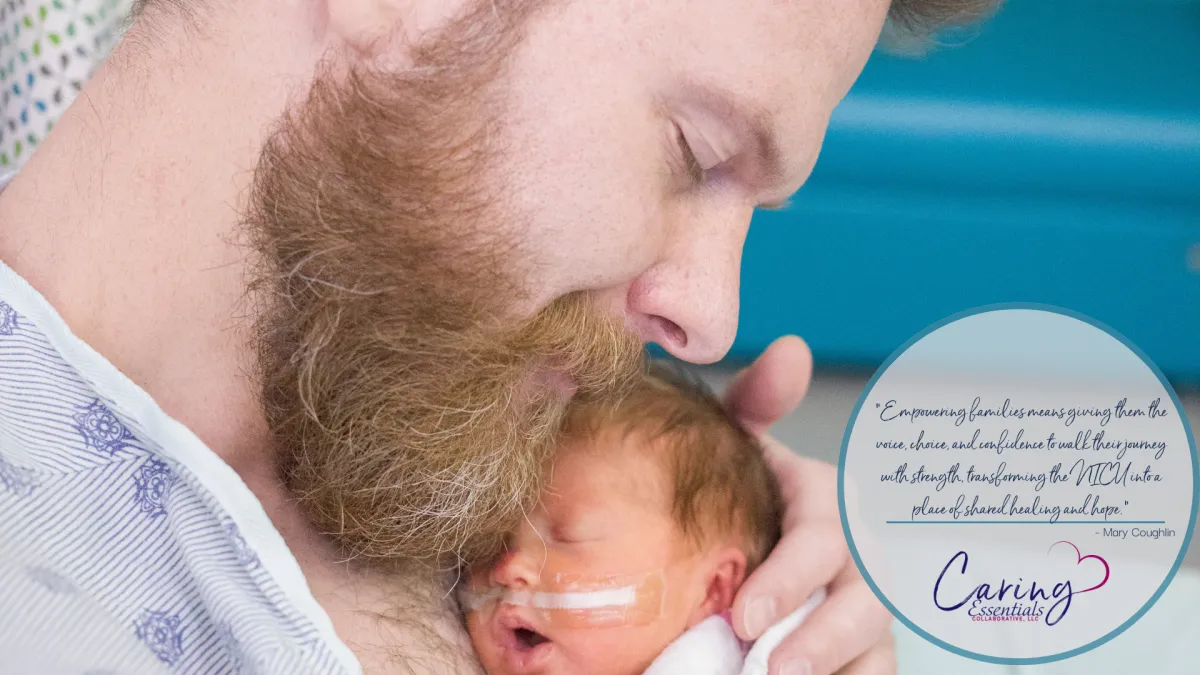
Empowerment, Voice, and Choice in Trauma-Informed Developmental Care: Giving Families the Power to Heal
"Empowering families means giving them the voice, choice, and confidence to walk their journey with strength, transforming the NICU into a place of shared healing and hope." - Mary Coughlin
In trauma-informed developmental care (TIDC), empowerment, voice, and choice are core principles that shape how we support families in the NICU. The journey of having a baby in intensive care can be deeply disorienting for parents, leaving them feeling powerless amid the overwhelming routines, machines, and medical interventions surrounding their child When caregivers commit to giving families a meaningful role, honoring their voices, and respecting their choices, they help transform the NICU experience into one of shared purpose, healing, and connection.
Why Empowerment Matters in the NICU
For parents, feeling disempowered in the NICU can add layers of emotional stress to an already difficult experience. Empowerment, however, brings parents into the circle of care as active participants. Empowered families feel capable, informed, and confident in their ability to care for their baby, which fosters resilience, strengthens bonds, and enhances the healing journey.
When families feel they have a voice in the NICU, they are more likely to be engaged, feel respected, and contribute meaningfully to their child’s well-being. In turn, caregivers benefit from parents’ unique insights, which can improve care practices and lead to a more supportive, cohesive caregiving environment.
How Voice and Choice Strengthen Trauma-Informed Care
A trauma-informed approach acknowledges that families need space to express their thoughts, preferences, and concerns. By respecting family voice and choice, caregivers can help alleviate the stress and trauma that accompany the NICU experience. Here are some ways to incorporate voice and choice into TIDC:
Inviting parents to ask questions and express concerns: Creating a space where parents feel safe to speak up fosters trust and deepens the family-caregiver connection.
Including families in decision-making: Asking parents about their preferences regarding their child’s care shows respect for their role and invites them to actively shape their baby’s experience in the NICU.
Recognizing family expertise: No one knows a baby quite like their family. By valuing their observations and instincts, caregivers can learn from parents’ perspectives and strengthen the partnership in care.
By honoring the voices of families, caregivers create an environment where healing is collaborative and families feel acknowledged as equal and vital contributors to their child’s care.
Empowering Families Through Education and Support
Empowerment in the NICU is grounded in providing families with the knowledge and support they need to make informed choices. Education can transform the NICU from a daunting environment into one where families feel capable and confident. Here’s how caregivers can empower families through education and support:
Sharing information in accessible ways: Explaining procedures, diagnoses, and care options in language that families can easily understand helps to remove barriers and reduce fear. Clear, compassionate communication allows families to feel informed and involved.
Providing hands-on opportunities: Encouraging parents to participate in their baby’s care—such as mealtimes, diapering, or holding their baby—gives them confidence and a sense of agency in the NICU.
Encouraging self-care and family support: Reminding families that their well-being is essential to their child’s healing and providing resources for family support can help parents feel seen and valued.
Through education and encouragement, caregivers create a path for families to become informed advocates for their child, equipped to make decisions and empowered to find their voice.
Giving Families Choice in the NICU
Choice is a powerful aspect of empowerment. In the NICU, providing families with choices, even in small matters, helps return a sense of control and normalcy to their experience. Examples of choice may include:
Having flexibility in care routines: Accommodating family schedules, preferences, and routines shows respect for their role and unique circumstances.
Personalizing the care environment: Encouraging parents to bring in family photos, blankets, or other familiar items can help create a comforting and personalized space for the baby and family.
Supporting family rituals and cultural practices: Honoring family traditions, practices, or beliefs around birth and caregiving enables families to feel that their values are respected.
Providing choices in the NICU reinforces the family’s role as active participants and respected partners in their child’s care journey.
The Ripple Effect of Empowerment, Voice, and Choice
When families are empowered to use their voice and make choices in the NICU, the effects are profound. Babies benefit from an environment where their parents are present, confident, and engaged in their care, fostering strong early bonds. Families leave the NICU with a greater sense of resilience, knowing they played an essential role in their child’s health and development.
Empowerment also strengthens caregivers. By sharing responsibility and inviting families into the care process, caregivers build trust, deepen their compassion, and experience the reward of seeing families flourish. The entire NICU becomes a place where healing is shared, voices are honored, and every family feels that they belong.
Embracing Empowerment, Voice, and Choice in Trauma-Informed Care
Empowerment, voice, and choice are not just principles—they are transformative actions that define trauma-informed developmental care. At Caring Essentials, we believe that every family deserves to feel capable, respected, and heard in the NICU. By honoring these principles, we create a space where healing and connection are truly collaborative.
With a commitment to empowerment and partnership,
Mary Coughlin
I’d love to hear your thoughts and experiences on supporting empowerment, voice, and choice in the NICU. Together, let’s create a care environment where families feel fully supported, valued, and active in their journey.
